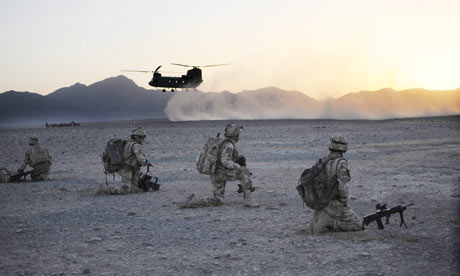-
Tuesday 1 February 2011 19.00 GMT
- Article history

Extra Chinook helicopters to support British troops in Afghanistan are potential casualties of a fresh spending crisis facing the armed forces, months after ministers hastily put together the long-awaited strategic defence and security review.
Twelve Chinooks were promised by the government in the autumn's defence review, but Peter Luff, the defence procurement minister, has now said the contract is "subject to negotiation".
He was responding to questions in the Commons yesterday as the MoD searches frantically for at least £1bn in emergency cuts ahead of this year's spending round.
Defence officials have told the Guardian the MoD is negotiating a new deal on the Chinooks.
Jim Murphy, the shadow defence secretary, said today: "The government need to come clean. If they don't sign the contract in this planning round, the vital helicopters they pledged to our troops in Afghanistan will not be delivered during combat operations.
"If this promise is broken, serious doubts will be raised about the government's ability to deliver on its rushed defence review."
Labour was attacked while in office for not giving British forces in Afghanistan sufficient helicopters. In October 2009, Liam Fox, now the defence secretary, called for "the earliest possible increase" in the number of helicopters there.
Officials discovered financial shortfalls in MoD commitments that were overlooked – deliberately or otherwise – in the rush to get a deal for the review's October deadline. Ministers need to sign off new cost cuts by the end of March.
"This is shaping up to be one of the toughest annual planning rounds in the MoD's history," Professor Malcolm Chalmers, of the Royal United Services Institute, said. "In order to make the sums add up, further cuts, beyond those announced in the strategic defence and security review, will be needed.
"There is a widespread perception in Whitehall that the MoD is incapable of running its own budget. The MoD's new management – political and official – is determined to show things have changed."
A defence official said: "We are looking at everything to see that commitments match resources."
Luff told the Financial Times, shortly after the defence review was agreed in October: "There is more to do ... There will be some big decisions yet to take. The figures are eyewatering."
The Chinooks are under threat as the RAF fights to reprieve its Tornado bombers in Afghanistan, saved in the review at the expense of Harrier jump jets.
Officials are said to be looking at a cut in the number of Tornados from over 100 to 60, a figure that could satisfy current operational needs abroad.
Defence analysts have expressed surprise at the decision to maintain the Tornado fleet. "There is growing pressure to look again at the budgetary ringfencing provided for Afghanistan-related capabilities, especially in those areas – such as fast jets – where US assets are available in relative abundance," Chalmers said.
"We are on the horns of a dilemma. Where can you make big savings are [on projects] deemed politically unacceptable?" one senior defence official said.
Problems facing defence chiefs are exacerbated by rising fuel costs, pointing to potential cuts in maritime operations and in training and exercises involving all three armed forces.
Other candidates for cancellation or delay include plans to increase the RAF's fleet of Reaper and Predator drones for use in Afghanistan.
The RAF is expected to get rid of more than 50 Eurofighter Typhoon aircraft which became operational three years ago at a cost of more than £4.5bn. Air Vice Marshal Greg Bagwell, the head of the RAF's fighter and bomber force, was reported as saying last year that this first group of Eurofighters would be "prohibitive for us to operate" and "too expensive to modify". The planes may be sold to Oman.
Defence officials also say redesigning the navy's two planned aircraft carriers will initially cost an extra £190m. Delays in building the ships have already increased their combined cost by £650m to more than £5bn. The MoD delayed the project to avoid spending in the short term.

No comments:
Post a Comment